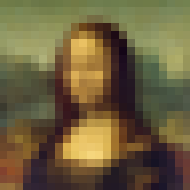Update January 2023
Google Play decided that my app is too old and unmaintained to allow people to run it on their modern devices. However, after testing on Android 13, it looks like the app still works for the most part. Download the latest APK from here.
——————————————————————————
What makes a face unique? Faces are packed with details and information about a person’s past (age, sex, race, identity) and future (attention and focus). How much detail can we remove from a face before it stops making sense to us? One possible approach would be to reason in pixels and find the minimum resolution required to make a face identifiable. For instance, the following image has only 24×24 discrete points.

Another approach is to reason like a facial recognition system. In the world of biometrics, there are several ways to identify each face, and they are often combined to achieve better results. One of these approaches consists of tracking distinct features of a face, (chin, mouth, left and right eye…) in a 2 or 3D space. Measuring the distance between those points can yield good results in identifying a face.
This is where polygonSelfie enters the picture. Looking at the wireframe version of our faces reveals a seductive and deceptively simple aesthetic. Gone are the messy details of the window to our soul. We are left with a barebone, vectorial version of ourselves. As selfies continue to represent the story of Narcissus in the XXI century, polygonSelfie offers us a peek into an increasingly likely future, one in which the continuous merging with the Machine and the acceptance of a universal Panopticon have become the norm.
polygonSelfie is an Android app, compatible with most mobile phones and tablets with an integrated camera. polygonSelfie is very processor-intensive and its prolonged usage may over-heat your device. polygonSelfie could not exist without the fabulous community behind openFrameworks, the powerful dlib toolkit and, last but not least, Boris Nikolaevich Delaunay.



